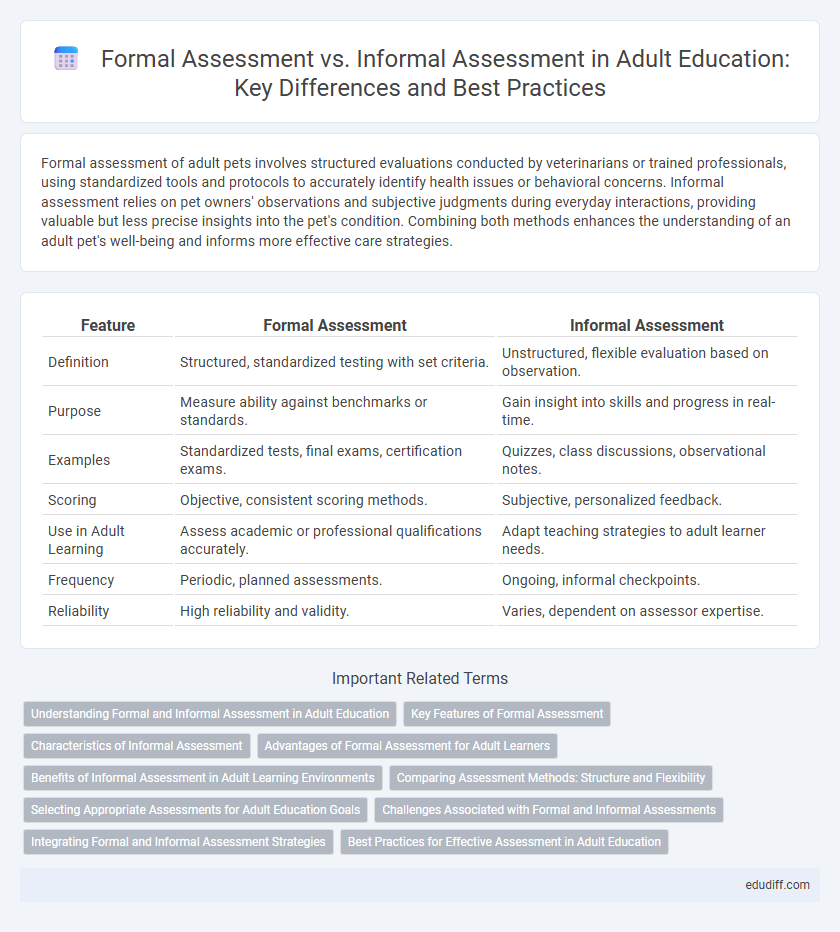Formal assessment of adult pets involves structured evaluations conducted by veterinarians or trained professionals, using standardized tools and protocols to accurately identify health issues or behavioral concerns. Informal assessment relies on pet owners' observations and subjective judgments during everyday interactions, providing valuable but less precise insights into the pet's condition. Combining both methods enhances the understanding of an adult pet's well-being and informs more effective care strategies.
Table of Comparison
| Feature | Formal Assessment | Informal Assessment |
|---|---|---|
| Definition | Structured, standardized testing with set criteria. | Unstructured, flexible evaluation based on observation. |
| Purpose | Measure ability against benchmarks or standards. | Gain insight into skills and progress in real-time. |
| Examples | Standardized tests, final exams, certification exams. | Quizzes, class discussions, observational notes. |
| Scoring | Objective, consistent scoring methods. | Subjective, personalized feedback. |
| Use in Adult Learning | Assess academic or professional qualifications accurately. | Adapt teaching strategies to adult learner needs. |
| Frequency | Periodic, planned assessments. | Ongoing, informal checkpoints. |
| Reliability | High reliability and validity. | Varies, dependent on assessor expertise. |
Understanding Formal and Informal Assessment in Adult Education
Formal assessment in adult education involves structured evaluations such as standardized tests, quizzes, and certification exams designed to measure specific learning outcomes and competencies. Informal assessment includes unstructured methods like observations, discussions, and self-reflections that provide ongoing insights into adult learners' progress and understanding. Combining formal and informal assessments allows educators to create a comprehensive understanding of adult learners' abilities and tailor instructional strategies effectively.
Key Features of Formal Assessment
Formal assessment is characterized by standardized procedures and objective scoring methods, ensuring consistent measurement of adult learners' knowledge and skills. It typically involves structured tests, such as exams or quizzes, with predetermined criteria and formal documentation of results. This approach supports valid comparisons across individuals and helps identify specific learning outcomes or competency gaps in adult education programs.
Characteristics of Informal Assessment
Informal assessment in adult education is characterized by its flexibility, spontaneous nature, and adaptability to individual learning contexts. It often involves observational methods, discussions, and unstructured feedback rather than standardized testing. This approach allows educators to gauge comprehension and skills development in real-time, promoting personalized learning experiences.
Advantages of Formal Assessment for Adult Learners
Formal assessment offers adult learners consistent and standardized evaluation methods, ensuring objective measurement of skills and knowledge aligned with industry standards. These assessments provide clear benchmarks and certification opportunities, enhancing career advancement and professional credibility. Structured feedback from formal assessments supports targeted learning improvements and motivates adults to achieve specific goals.
Benefits of Informal Assessment in Adult Learning Environments
Informal assessment in adult learning environments fosters a more flexible, learner-centered approach by enabling real-time feedback and adjustments tailored to individual progress. It promotes authentic engagement through natural interactions, encouraging critical thinking and practical application of skills without the pressure of formal testing. This continuous, low-stakes evaluation enhances motivation and supports diverse learning styles, ultimately improving knowledge retention and learner confidence.
Comparing Assessment Methods: Structure and Flexibility
Formal assessment methods in adult education are highly structured, featuring standardized tests and clear scoring criteria that ensure consistency and comparability across learners. Informal assessments offer flexibility by allowing educators to gauge skills and knowledge through observations, discussions, and practical activities tailored to individual learner needs. While formal assessments prioritize reliability and objectivity, informal methods emphasize adaptability and real-time feedback, crucial for personalizing adult learning experiences.
Selecting Appropriate Assessments for Adult Education Goals
Selecting appropriate assessments for adult education goals involves aligning evaluation methods with learners' diverse backgrounds, learning objectives, and practical skill applications. Formal assessments, such as standardized tests and certifications, provide measurable outcomes suited for credentialing and benchmarking progress in professional contexts. Informal assessments, including observations, discussions, and self-assessments, offer flexible, ongoing insights that support personalized learning pathways and real-world skill development.
Challenges Associated with Formal and Informal Assessments
Formal assessments often pose challenges such as standardized testing anxiety, rigid scoring criteria, and limited adaptability to individual learning styles, which can hinder accurate measurement of adult competencies. Informal assessments face difficulties including observer bias, inconsistent administration, and lack of comprehensive documentation, impacting the reliability and validity of the outcomes. Balancing these challenges requires integrating diverse assessment methods to capture a holistic view of adult learners' skills and knowledge.
Integrating Formal and Informal Assessment Strategies
Integrating formal and informal assessment strategies enhances adult learning by providing comprehensive insights into learner progress and needs. Formal assessments offer structured, standardized data on specific competencies, while informal assessments capture contextual understanding and ongoing engagement. Combining these approaches supports personalized instruction and effective skill development in adult education settings.
Best Practices for Effective Assessment in Adult Education
Formal assessment in adult education typically involves standardized tests, structured rubrics, and clearly defined criteria that ensure consistency and comparability of results. Informal assessment relies on observations, discussions, and reflective activities that provide real-time feedback and adapt to learners' needs. Best practices combine both approaches by aligning assessments with learning objectives, fostering continuous improvement through timely feedback, and accommodating diverse adult learning styles and experiences.
Formal Assessment vs Informal Assessment Infographic

 edudiff.com
edudiff.com